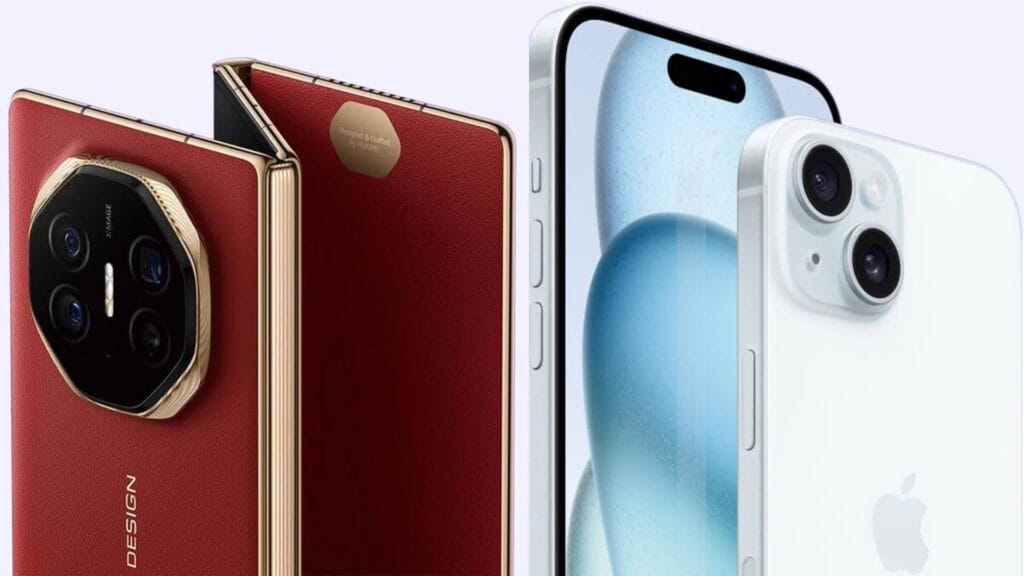Apple unveils AI-powered iPhone 16 amid Huawei’s tri-fold phone surge
Apple has revealed its latest iPhone 16, showcasing cutting-edge artificial intelligence capabilities, just as Chinese competitor Huawei began racking up preorders for its revolutionary tri-fold smartphone.

Apple has revealed its latest iPhone 16, showcasing cutting-edge artificial intelligence capabilities, just as Chinese competitor Huawei began racking up preorders for its revolutionary tri-fold smartphone.
The launch sets the stage for a heated battle between the tech giants, as both companies vie for dominance in the AI-driven future of smartphones.

“The next generation of iPhone has been designed for Apple Intelligence from the ground up. It marks the beginning of an exciting new era,” said Apple CEO Tim Cook at the unveiling.
The iPhone 16 introduces the A18 chip, an aluminum back, and a customizable button designed for camera control—marking significant hardware and software upgrades. Yet, Apple’s reveal came on the heels of Huawei’s latest innovation: a Z-shaped tri-fold phone. Huawei’s preorders exceeded three million by Monday, reinforcing the Chinese company’s growing influence in the premium phone market, despite U.S. sanctions.
A Growing Battle for AI Supremacy
The simultaneous product launches from Apple and Huawei highlight the increasing consumer appetite for AI features. As Huawei solidifies its market in China, Apple faces challenges in delivering its AI advancements to the Chinese market. Industry expert Ben Bajarin, CEO of Creative Strategies, noted, “The Chinese market is hungrier for AI features than the U.S. market. For Apple, it will be very difficult to bring it to China immediately, so they’ll be going off the merits of the hardware.”
At its June developer conference, Apple introduced its generative AI platform, Apple Intelligence, which promises to produce text, images, and other content on demand. However, these advanced features are expected to be rolled out gradually, starting with a software update likely in October. A full upgrade of Apple’s voice assistant, Siri, will follow in early 2025.
Huawei’s preorders for its tri-fold Mate XT phone demonstrate its ability to compete with Apple, particularly in AI, where Chinese consumers are eager for new features.
Alongside the iPhone 16, Apple also introduced a refreshed lineup of wearable tech. The Apple Watch Series 10, starting at $399, boasts a thinner design and a screen that is up to 30% larger than previous models. With enhanced health-monitoring features like sleep apnea detection and emergency fall response, the Series 10 is geared toward sports and wellness enthusiasts.
Meanwhile, the rugged Watch Ultra 2, priced at $799, targets adventurers, and the redesigned AirPods 4 promise improved comfort and sound quality, along with new hearing-aid features pending U.S. regulatory approval.
Also Read: French film giant Alain Delon dies aged 88
Apple is not the only company pushing AI features. Google has been accelerating its AI advancements with features like Gemini Live, a live conversational assistant, and integrating AI across its Android ecosystem. Google’s decision to unveil its Pixel smartphones earlier than usual in 2024 signals the intensifying competition as major players race to dominate the AI-powered smartphone market.
As Apple fans eagerly await the launch of Apple Intelligence, its reception in China remains uncertain due to the need for regulatory approval. The growing competition between Apple and Huawei in AI-driven innovation underscores the fierce rivalry ahead, as both companies seek to capitalize on a future where smartphones are smarter, more personalized, and more capable than ever before.













